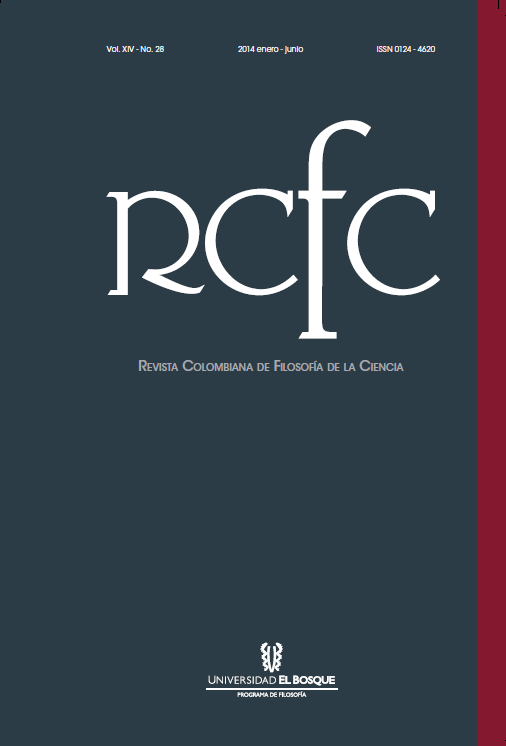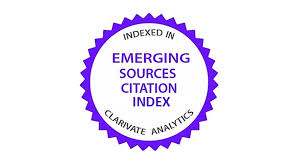La vigencia de la metafísica evolucionista de Peirce
DOI:
https://doi.org/10.18270/rcfc.v14i28.675Resumen
En este artículo presento a Charles S. Peirce como un autor inmerso en los debates
científicos de su época, cuya mirada integradora lo convierte en precursor de las actuales
investigaciones sobre el comportamiento de sistemas auto-organizantes lejos del equilibrio
y de una “síntesis evolutiva expandida” que no solo toma elementos de diversas
ramas de la biología sino de la física. Esta capacidad de síntesis no debe sorprendernos
si se examina la influencia del pensamiento evolutivo de Lamarck y Darwin, que junto
con la mecánica estadística de Boltzmann y Maxwell ejercieron sobre la metafísica evolucionista
Peirce. En este sentido presento la noción de “hábito” lamarckiano, como el
factor mediador entre las perturbaciones provocadas por las circunstancias externas y las
variaciones morfológicas heredables de los organismos, la cual por generalización contribuyó
a la formulación de la categoría de la terceridad, mientras que la triada darwiniana
variación, herencia y selección fue entendida como una especificación de las categorías
de primeridad, segundidad y terceridad. Por otra parte, Boltzmann influyó en la aceptación
del azar ontológico (primeridad) y la idea de una flecha del tiempo irreversible y
continuo, asociada a la terceridad. Discuto cómo, en oposición a la recurrencia cíclica en
un universo ergódico propuesta por Poincaré, Peirce propuso ad hoc la “ley de la mente”
para salvar la flecha del tiempo irreversible y creativo. En el contexto de la ciencia del
siglo XIX, era correcto postular la “ley de la mente” para salvar la idea de evolución como
argumento irrefutable y convincente en contra de la hegemónica visión mecánica de la
naturaleza que no podía explicar a) la determinación de las condiciones iniciales, b) la
emergencia de comportamientos orientados a metas específicas, y c) las bifurcaciones
evolutivas generadas en elecciones impredecibles. La influencia de Maxwell en Peirce,
se percibe en las explicaciones sobre los efectos anti-entrópicos ordenadores, las contingencias
temporales, las bifurcaciones en momentos críticos y la argumentación contra
la ergodicidad del universo. Para finalizar, presento una reflexión sobre la vigencia de
las ideas peirceanas sobre la “evolución agapástica”, donde la “elección individual”, el
hábito, la inteligencia promueven la cooperación, la reciprocidad, la asociación simbiótica
y mutualista, contribuyendo así al incremento del potencial creativo de la naturaleza.
Descargas
Referencias bibliográficas
Andrade, Eugenio. Los demonios de Darwin. Semiótica y termodinámica de la
evolución. Bogotá: Universidad Nacional de Colombia, 2009.
—. La ontogenia del pensamiento evolutivo, Bogotá: Universidad Nacional de
Colombia – Obra Selecta, 2009.
Baldwin, James. “A New Factor in Evolution.” American Naturalist 30 (1896):
-451, 536-553.
Bowles, Samuel. Gintis, Herbert. A Cooperative Species. Human Reciprocity
and Its Evolution, Princeton: Princeton University Press, 2011.
Brillouin, Leon. “Maxwell’s Demon Cannot Operate: Infromation and
Entropy I.” Journal of Applied Physics 22 (1951): 334-37.
Brooks, Daniel. Wiley, E. O.. Evolution as Entropy, Chicago: University of
Chicago Press, 1988.
Burkhardt, Richard W. The Spirit of System. Lamarck and Evolutionary Biology,
Cambridge: Harvard University Press, 1995.
Caponi, Gustavo. “Contra la lectura adaptacionista de Lamarck”, en:
Alejandro Rosas (ed.), Filosofía, Darwinismo y Evolución, Bogotá: Universidad
Nacional de Colombia (2009): 3-17.
Darwin, Charles. The origin of species by means of Natural Selection or the preservation
of favoured races in the struggle for life (edition based on the text of
first edition, London: Murray), London: ElecBook, 1997.
—. “Letter 2449 – Darwin to Wallace, 6 April 1859” (accesible www.
darwinproject.ac.uk/entry-2449).
—. “Letter to Asa Gray”, en: Francis Darwin (ed.), Life and Letters of Charles
Darwin, Middlesex: The Echo Library, vol.II, 459 (accesible www.echolibrary.
com).
—. “Letter 3822 – Darwin to Hooker, 24 November 1862” (accesible http://
www.darwinproject.ac.uk/darwinletters/calendar/entry-3822.html).
—. The Descent of Man And Selection in Relation to Sex (vol. 1), London:
Murray, 1871.
—. The Origin of Species by means of natural selection or the rpeservation of
favored races in the struggle for life, London: Murray, 1872 (Sixth Edition).
—. The Formation of Vegetable Mould, through the Action of Worms with Observations
on Their Habits, Chicago: Chicago University Press, 1985.
—. El Origen de las Especies, Barcelona: Edicomunicación, 2001.
Dawkins, Richard. The Selfish Gene, New York: Oxford University Press,
Depew, David. & Weber, Bruce. Darwinism Evolving. Systems Dynamics and
the Genealogy of Natural Selection, Cambridge: The MIT Press, 1995.
Eigen, Manfred. “Self-organization of matter and the evolution of biological
macromolecules”, Naturwissenschaften 58 (1971): 465-523.
Eco, Umberto. “Metaphor”, en: M. Dascal, D. Gerhardus, K. Lorenz, G.
Meggle (eds.), Philosophy of Language. An International Handbook of
Contemporary Research 2 (1996): 1313-1323.
Esposito, Joseph. Evolutionary Metaphysics. The Development of Peirce’s Theory
of Categories, Athens: Ohio University Press, 1980.
Fisher, Ronald. The Genetical Theory of Natural Selection, New York: Oxford
University Press, 1958.
Gissis, Snait. Jablonka, Eva. Transformations of Lamarckism. From Subtle
Fluids to Molecular Biology, Cambridge: The MIT Press, 2011.
Griffin, Donald. Animal Minds, Chicago: University of Chicago Press, 1992.
Jablonka, Eva. & Lamb, Marion. “Epigenetic inheritance in evolution”,
Journal of Evolutionary Biology 11 (1998): 159-183.
—. Evolution in four dimensions. Genetic, Epigenetic, Behavioral, and Symbolic
Variation in the History of Life, Cambridge: The MIT Press, 2004.
Jaeger, Werner. La Teología de los Primeros Filósofos Griegos, México: Fondo de
Cultura Económica, 1997.
Johnston, T. D. “Toward a Systems View of Development: An Appraisal of
Lehrman’s Critique of Lorenz”, en: S. Oyama, E. Griffiths, R. Gray (eds.),
Cycles of Contingency. Developmental Systems and Evolution, Cambridge:
The MIT Press, (2001):15-23.
Jonas, Hans. The Phenomenon of Life: Toward a Philosophical Biology, Chicago:
University of Chicago Press, 1966.
Kauffman, Stuart. The Origins of Order: Self-Organization and Selection in
Evolution, New York: Oxford University Press, 1993.
—. Investigations, Oxford: Oxford University Press, 2000.
—. “Towards a Post Reductionist Science: The Open Universe” (accesible
http://arxiv.org/PS_cache/arxiv/pdf/0907/0907.2492v1.pdf)
Kropotkin, Piotr. Mutual Aid. A Factor of Evolution (accesible www.marxists.
org/reference/archive/kropotkin-peter/1902/mutual aid/index.htm).
Hausman, Carl. Charles S. Peirce’s Evolutionary Philosophy, Cambridge:
Cambridge University Press, 1993.
Lamarck, Jean-Baptiste. Recherches sur l’organization des corps vivants, París:
Pole HSTL du CRHST, Unité Mixte de Recherche CNRS/Cité des sciences
et de l’industrie, 2001 (accesible http://www.crhst.cnrs.fr).
—. Filosofía zoológica, Barcelona: Alta Fulla, 1986.
—. “Histoire naturelle des animaux sans vertebres”, en : (Burkhardt 1995,
-170).
Lloyd, Seth. Programming the Universe, New York: Knopf, 2006.
Lovejoy, Arthur. La Gran Cadena del Ser. Historia de una Idea, Barcelona:
Icaria, 1983.
Margulis, Lynn. “On Origen of Mitosing Cells”, Journal of theoretical biology
(3) (1967): 225-274.
Margulis, Lynn. Origins of Eukaryotic Cells, New Haven: Yale University
Press, 1975.
Maturana, Humberto. Varela, Francisco. The Tree of Knowledge. The Biological
Roots of Human Understanding, London: Shambala, 1992 (revised edition).
Maxwell, James Clerk. “Letter to Galton – 28 February 1870”, en: J. C.
Maxwell, The Scientific Letters and Papers of James Clerk Maxwell: 1874-
(ed. Harman) (vol. 3), Cambridge: Cambridge University Press,
(1990): 31.
Maxwell, James Clerk. Theory of Heat, London: Longmans, Green and Co,
Mc Mullin, Ernan. “From matter to materialism … and (almost) back”,
en: Davies, N. H. Gregersen (eds.), Information and the Nature of Reality,
Cambridge: Cambridge University Press, (2010): 13-37.
Menand, Louis. El club de los metafísicos. Historia de las ideas en América,
Barcelona: Destino, 2001.
Mereschkowski, C. “Over nature and origin. Chromatophoren in the
Pflanzenreiche”, Biol. Centralbl. 25 (1905), 593-604, 689-691 (traducción
al inglés: W. Martin, K. V. Kowallik, “Annotated English translation of
Mereschkowsky’s 1905 Paper “Over nature and origin. Chromatophoren
in the Pflanzenreiche”, Eur. J. Phycol. 34 (1999): 287–295).
Monod, Jacques. El Azar y la Necesidad. Ensayo sobre la Filosofía Natural de la
Biología Moderna, Barcelona: Orbis, 1970.
Popper, Karl. Conjectures and Refutations: The Growth of Scientific Knowledge,
New York: Harper Torchbooks, 1968.
—. Unended Quest, Chicago: Open Court Publishing, 1976.
Prigogine, Ilya. Stengers, Isabelle. Order out of Chaos. Man’s new dialogue with
nature, New York: Bantam Books, 1984.
Reynolds, Andrew. Peirce’s Scientific Metaphysics. The Philosophy of Chance,
Law and Evolution, Nashville: Vanderbilt University Press, 2002.
Riedl, Rupert. Biología del conocimiento. Los fundamentos filogenéticos de la
razón, Barcelona: Labor Universitaria, 1983.
Ruse, Michael. El Misterio de los Misterios. ¿Es la evolución una construcción
social?, Barcelona: Metatemas, 2001.
Russell, Bertrand. La Sabiduría de Occidente, Madrid: Aguilar, 1960.
Salthe, Stanley. Development and Evolution. Complexity and Change in Biology,
Cambridge: The MIT Press, 1993.
—. “Energy, Development, and Semiosis”, en: E. Taborsky (ed.), Semiosis,
Evolution, Energy: Towards a Reconceptualization of the Sign, Aachen:
Shaker Verlag, (1999): 245-261.
—. “The Spontaneous Origin of New Levels in a Scalar Hierarchy”, Entropy
(2004): 327-343.
Schneider, Eric. Sagan, Dorion. Into the Cool. Energy Flow, Thermodynamics
and Life, Chicago: University of Chicago Press, 2005.
Short, T. L. “Darwin’s concept of final cause: neither new nor trivial”, Biology
and Philosophy 17 (2002): 323-340.
—. Peirce’s Theory of Signs, Cambridge: Cambridge University Press, 2007.
Stewart, Ian. ¿Juega Dios a los dados? La nueva matemática del caos, Barcelona
: Grijalbo, 1996.
Stewart, John. La Vie existe-t-elle? Reconcilier genetique et biologie, París:
Vuibert, 2004.
Varela, Francisco. “Patterns of life: Intertwining identity and cognition”,
Brain and Cognition 34 (1) (1997), 72–87.
Villaveces, José Luis. Cubillos, Germán. Andrade, Eugenio. “Del Sustancialismo
al Atomismo en la Química”, en: Hacia una historia epistemológica de
la química, Bogotá: Academia Colombiana de Ciencias Exactas, Físicas y
Naturales, Colección Enrique Pérez Arbeláez 8, (1989): 53-62.
Waddington, Conrad. The Strategy of the Genes, London: Geo Allen &
Unwin, 1957.
—. “Genetic assimilation”, Advances Genetics 10 (1961): 257-293.
West-Eberhardt, Mary Jane. Developmental Plasticity and Evolution, New
York: Oxford University Press, 2003.
Williams, George. Adaptation and Natural Selection. A Critique of Some
Current Evolutionary Thought, Princeton: Princeton University Press, 1966.
Wright, Sewall. “Evolution in Mendelian Populations”, Genetics 16 (1931):
-159 (reimpreso en S. Wright, Evolution: Selected Papers (ed. Provine),
Chicago: University of Chicago Press, (1986): 98-160).
—. “The Roles of Mutation, Inbreeding, Crossbreeding and Selection in
Evolution”, Proceedings of the Sixth Annual Congress of Genetics 1 (1932):
-366 (reimpreso en S. Wright, Evolution: Selected Papers (ed. Provine),
Chicago: University of Chicago Press, (1986): 161-177.
Descargas
Publicado
Cómo citar
Número
Sección

| Estadísticas de artículo | |
|---|---|
| Vistas de resúmenes | |
| Vistas de PDF | |
| Descargas de PDF | |
| Vistas de HTML | |
| Otras vistas | |











